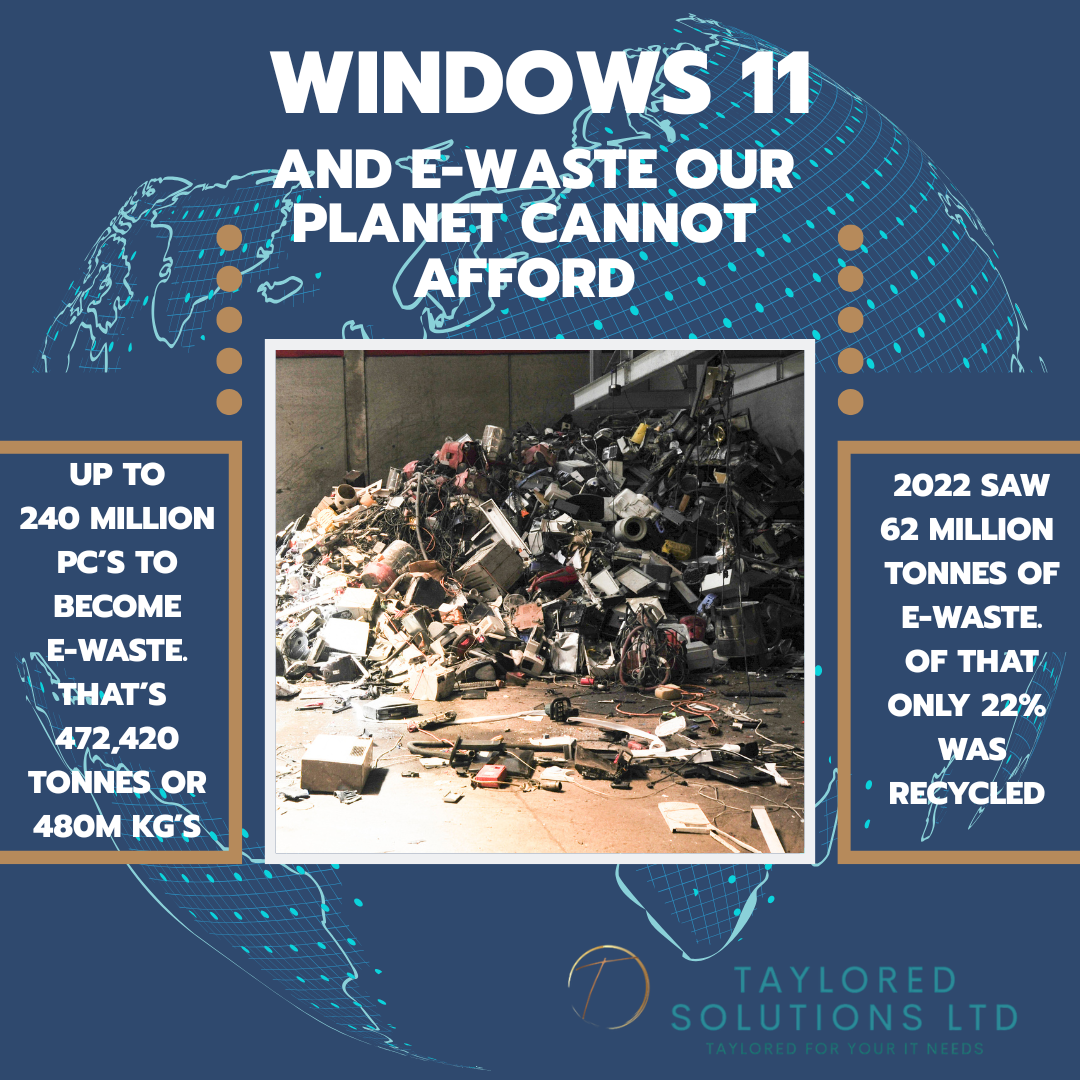Microsoft 11 and The Electronic Waste The Earth Cannot Afford
Tech and Forced Obsolescence

In our house, computers aren’t just machines, they’re part of the family. We give them names, we patch them up, we squeeze every bit of life from them. Under my desk right now is an older PC, not shiny or new, but it still works perfectly well because it has been cared for, upgraded and looked after over time.
This blog was born out of frustration when we had to buy a brand-new laptop, supposedly “Windows 11 ready.” The upgrade toggle didn’t work (apparently that’s common, according to the forums and even Microsoft admits it). After hours of wasted time, a workaround from CoPilot, we eventually got there.
As we did battle with the new machine, our conversation led to the realisation that three perfectly good laptops in the house may soon be “retired” simply because of Windows 11 compatibility issues. That’s when I started googling (there are other search engines available). The statistics I found shocked me. The estimated amount of perfectly good tech that is about to be written off, not because it’s broken like our replaced laptop, but because Windows 11's forced upgrade makes it so.
⸻
The Bigger Picture
This is part of a global problem, not just an inconvenience in our household. It's estimated that 240 million perfectly functional PCs are set for landfill because of forced software requirements for an upgrade you may not need or even want, rather than the machine being broken beyond repair.
The Scale of the Problem
Analysts predict that by the time Windows 10 support ends in October 2025, up to 200–240 million laptops and PCs could be made redundant purely because they don’t meet Windows 11’s hardware requirements [source: itpro.com; maombi.com]
These machines are not “old clunkers” (like my pink Sony Vaio which is tucker away) sitting in the back of cupboards (like my 16 year pink Sony Vaio), they’re in daily use, some just a few years old, running smoothly on Windows 10. What is the issue? Missing a specific security chip (TPM 2.0) or being built before Microsoft’s hardware cut-off.
The result? Perfectly good technology heading straight to landfill, fuelling a global e-waste crisis we already can’t keep up with.
Replacing working laptops puts pressure on businesses, schools and households. When we are already in global economic uncertainty.
Policy Contradiction: Circular Economy vs. Forced Obsolescence
The EU’s Circular Economy Action Plan and right-to-repair legislationefforts aim to lengthen product lifespans and reduce waste. What Microsoft's approach does the opposite. Pushing perfectly functional machines into obsolescence, directly undermining global sustainabilty goals.
We need software designed and developed to support extending hardware lifespans rather than updates rendering it useless before it's time.is doing is forcing functional machines into obsolescence, directly countering these policies. We need software that supports longer hardware lifespans, not designs that push devices into landfills unecessarily.
An Electronic Waste Explosion
fill (such as gold, copper and iron)
E-waste is already the fastest-growing waste stream in the world. According to the Global E-Waste Monitor, over 62 million tonnes were generated in 2022: more than the weight of the Great Wall of China. Forcing millions of working laptops into premature retirement, enough to fill 1.5 million trucks in a line around the equator.
Only 22.3% of that was properly recycled, meaning almost 78% of 2022's e-waste ended up in landfill (such as gold, copper and iron)
Microsoft themselves have made public commitments to sustainability and carbon reduction [blogs.windows.com], but the Windows 11 roll-out tells a different story.
This is not acceptable.
⸻The Efficiency Myth
Surely, you might think, Windows 11 must run more efficiently? Otherwise, what’s the point?
Microsoft claims Windows 11 is “up to 2.3x faster” and offers “2.7 extra hours of battery life” [windowslatest.com]. But dig deeper and those figures often come from comparing brand new devices against 9-year-old Windows 10 hardware [tomshardware.com]. In independent tests, when Windows 10 and 11 run side-by-side on the same hardware, the performance difference is marginal, mostly within 1–5% [techspot.com].
In fact, some users have seen battery life drop after upgrading, forcing them to roll back to Windows 10 [reddit.com/r/Windows10]. Others notice no difference at all.
So if Windows 11 isn’t significantly more efficient, and often doesn’t improve performance on existing hardware, why are laptops just a couple of years old being pushed towards the scrap heap?
A Personal Example
There’s an ongoing argument in our house over my pink Sony Vaio. It's been upgraded and upgraded, living and working far longer than anyone expected. Even after my son once used it as part of a makeshift step ladder, I can’t bring myself to part with it. It was no longern't in daily use and it was starting to show quirks of old agehave it niggles, but it shows how long a machine can keep going if you give it the chance. I know its days are numbered, not because it is actually’s broken, but because even if we fixed the being stood on damage, it will won't run Windows 11 without a number of workarounds. Honestly though, they just don’t make them as pretty in pink anymore.
Right-to-Repair & Design Accountability
Some countries now require repairability scores or legislation that keeps devices serviceable. Microsoft and OEMs could:
•Publish repairability indexes.
•Support modular designs and easier component replacement.
•Offer discounted ESU or lightweight Windows versions for capable, non-compliant devices.
While for me there is a bit of nostalgia, the turuth is it’s about sustainability, fairness, and choice. A 10-year-old computer can still do everything an average user needs - browse the web, run office tools, connect on social media, stream and manage personal security.
⸻
Suing Microsoft
In California, Lawrence Klein has filed a lawsuit alleging Windows 10’s end of support is designed to force consumers into buying new Copilot-enabled devices. He argues this is unfair, wasteful, and anti-consumer.
His case highlights that this issue goes beyond online grumbles. Millions of users are effectively being forced to buy new hardware or wrestle with complex and costly upgrades. For many, it feels like corporate bullying hiding behind progress.
⸻
Can Anything Be Done?
There are workarounds to extend the life of older machines. But they’re rarely simple. They may involve technical knowledge, third-party software, or costs, things some people don’t have the time, money, or skills to navigate.
That is the point. Why should consumers be forced into hacks, complex fixes, or costly stopgaps in order to keep good machines working and safe. We can’t keep excusing waste like this as “progress.” Progress should mean better use of our resources, longer lifespans for devices, and smarter software that runs more efficiently on what we already own.
Instead of scrapping devices:
• Extend support for Windows 10 beyond 2025 (lawsuits are already pushing for this [techradar.com]).
• Allow lighter versions of Windows 11 for capable but non-compliant hardware.
• Offer genuine sustainability pathways, not just marketing slogans.
As businesses, as families, as individuals — we should be able to expect that technology leaders live up to their sustainability promises, not undermine them with planned obsolescence.
Ask yourself: if a decade-old computer can still run daily, why should a perfectly functioning four- or six-year-old one be consigned to the already over burdered scrap heap?
Progress should mean smarter, greener, longer-lasting solutions. Not another laptop or pc prematurely defunct.
Further Reading & References
• Vikas Chawla (Medium): Forced Windows 11 Upgrade: A Frustration for Users and an Environmental Concern
• Micro Fusion Insight: 5 Reasons Why You Should Think Twice Before Upgrading to Windows 11
• Dana Blankenhorn: Windows 11: A Forced Upgrade for the Agentic Web
• TechnoheadBlog: The Environmental Impact of Windows 11 Hardware Restrictions
• Tom’s Hardware: Windows 11 restrictions could render 240 million PCs obsolete
• The Verge: Microsoft refuses to loosen Windows 11 hardware requirements
• InfoTechLead: Windows 11 rollout heightens e-waste concerns
• Medium: The Troubling Problem of E-Waste
• The Cool Down: Reddit user slams Microsoft over Windows 11 e-waste
• Reddit /r/righttorepair: Windows 11 & end of Windows 10 support will create e-waste
• UN & Global E-Waste Monitor data: sources from ITU, UNEP, UNITAR .
• Laptop longevity studies:




